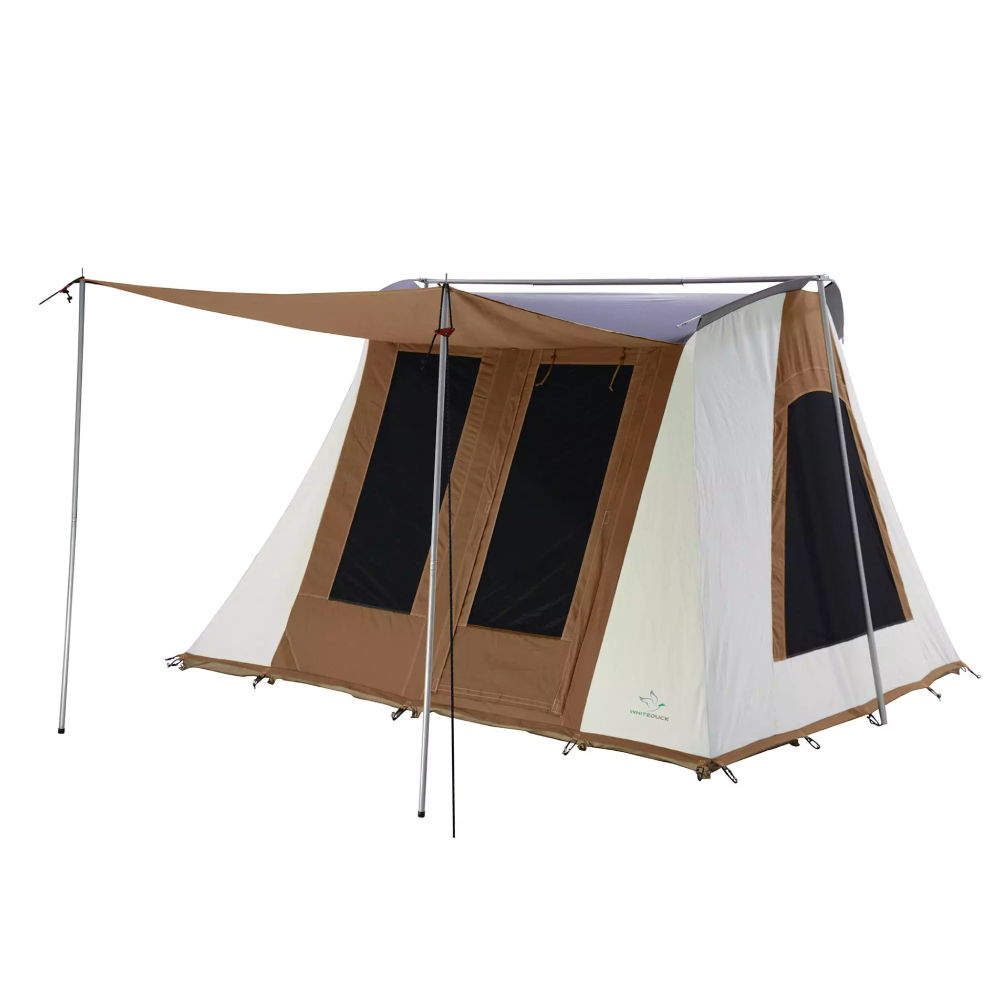We may earn revenue from the products available on this page and participate in affiliate programs. Learn more ›
Cabin tents are great for families, couples, or single car campers who want extra space. What makes a cabin tent different from other camping tents is its high walls. Most offer standing room throughout the tent, while others only have room to stand at the highest point in the middle. While not all cabin tents have the same design, the vast majority are freestanding or instant tents.
After researching some of the most popular tents from brands like Nemo, Coleman, and Woods, we spent a few nights testing out a couple of them. Below are our picks for the best cabin tents, whether it’s an instant tent you can set up in seconds or a durable canvas tent that you can use anywhere.
Best Overall: Nemo Aurora Highrise
Best Instant: Core 9 Person Instant Cabin Tent
Best 6-Person: Woods Lookout
Best Canvas: White Duck Outdoors Prota Cabin Tent
Best Budget: Coleman Instant Cabin Tent
Best Overall: Nemo Aurora Highrise
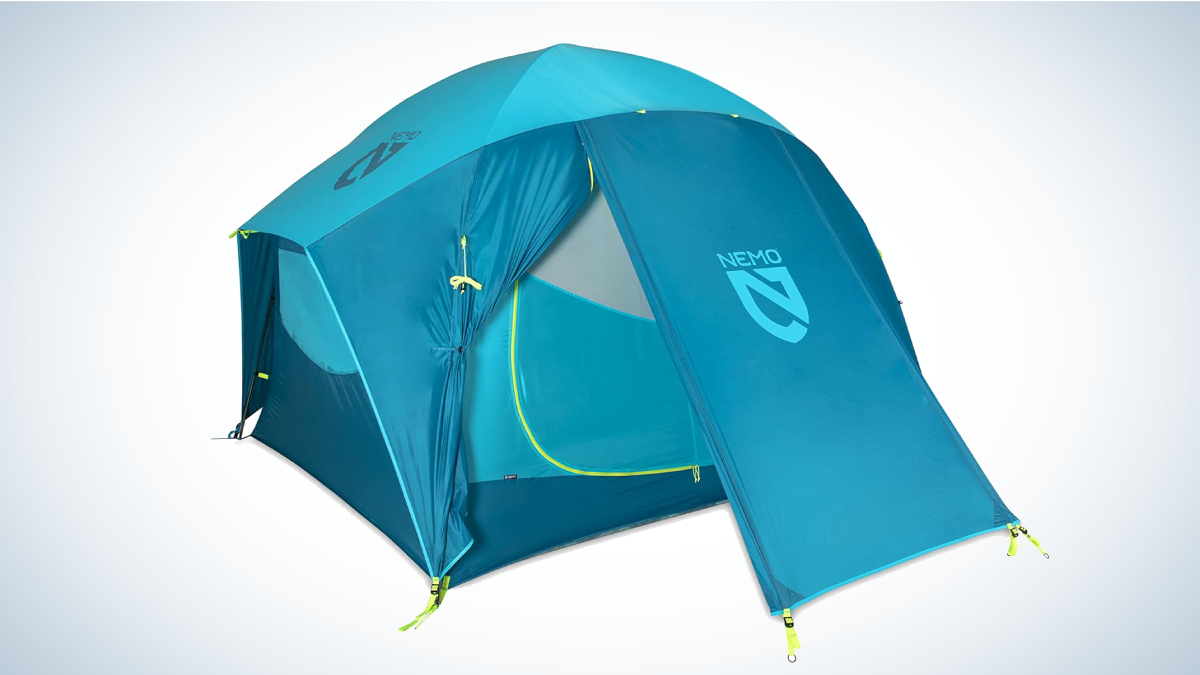
Specs (4-person)
Materials: 68D Polyester/ No-See-Um Mesh, 150D PU Polyester (floor), aluminum poles
Floor Dimensions: 90 x 100 in
Packed Size: 25.0 x 8.5 x 8.5 in
Peak Height: 75 in
Weight: 15 lb 14 oz
Pros
Nemo Lifetime warranty
Easy to set up and pack up
Roomy interior
Ample storage and vestibule area
Two doors even on the 4-person tent
Also available in a 6-person
Cons
Price
The Nemo Aurora Highrise is a thoughtful, easy-to-set-up tent design available in both 4- and 6-person sizes. Its straightforward setup makes it possible for one person to set this tent up on their own with minimal issues. And if you have at least two people, you can put it up in minutes. Inside the tent, you’ll find plenty of functional storage and features like a headlamp diffuser, synching ties for the rainfly, and a hideaway pouch for the front door fabric when the weather is nice.
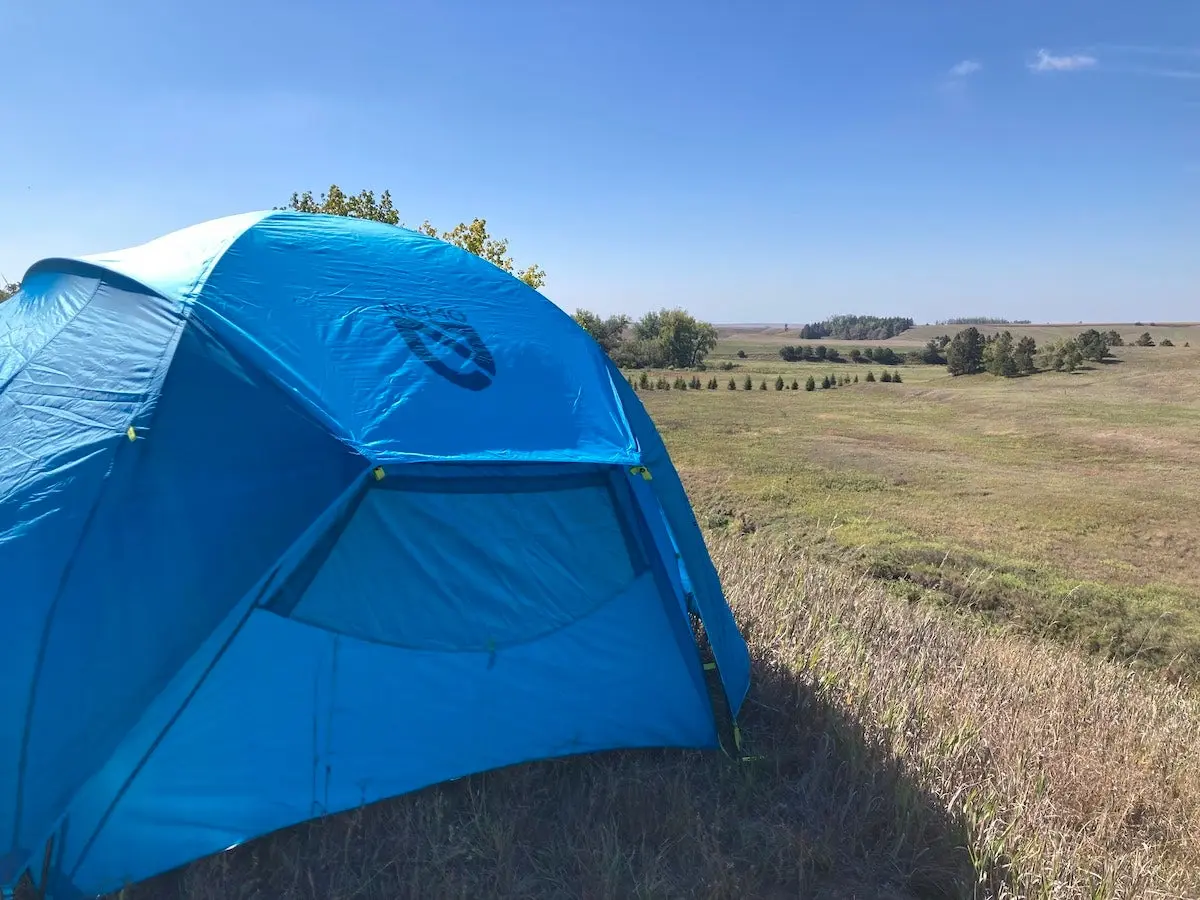
This Nemo cabin tent is one of my favorites I’ve ever used. Meg Carney
If you can get past the sticker shock on the Nemo Aurora, you’ll enjoy ample standing room inside the tent and roomy floor space. The floor fabric is made from a more durable material than the rest of the tent, which helps increase the overall lifespan of the tent (especially if you’re camping with kids or dogs).
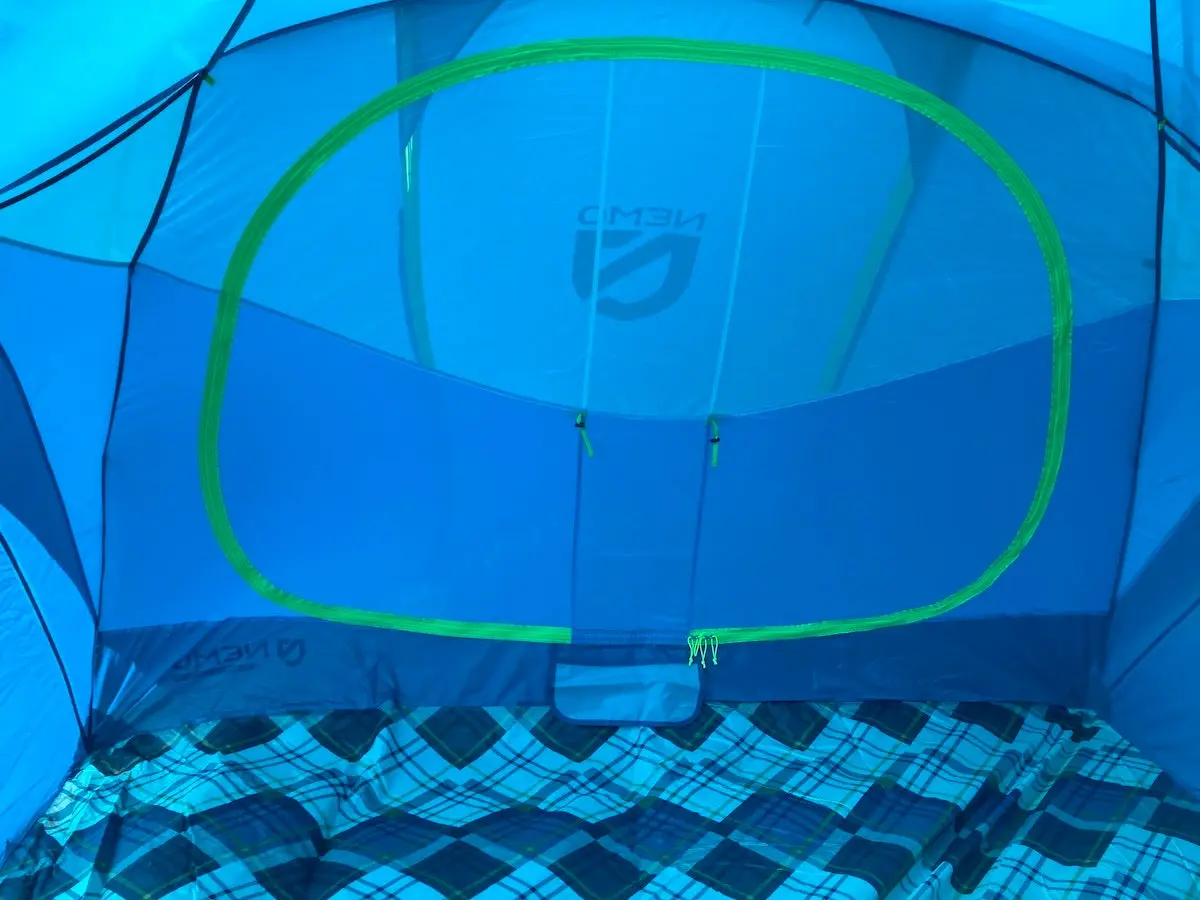
I like how much room there is inside of the Nemo Aurora. Meg Carney
Since this is a 3-season tent, ventilation is a must, and this tent has it all. There is plenty of ventilation strategically placed to reduce condensation, even with a rainfly on. If you choose to leave the fly off at night, the blue mesh on the ceiling was carefully selected to optimize stargazing capabilities. For a cabin tent, the dome shape is certainly unique, but the delivery rises high above the rest.
Best Instant: Core 9-Person Instant Cabin Tent
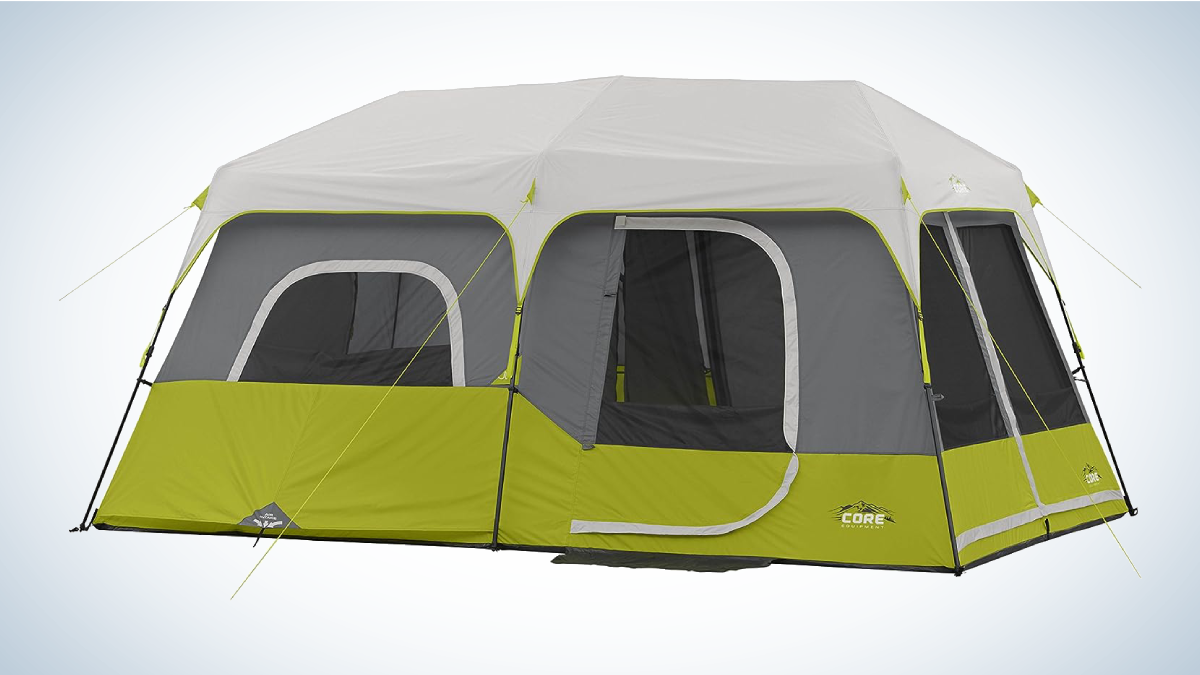
Specs
Materials: 68D Polyester, telescoping steel poles
Floor Dimensions: 14 X 9 feet
Packed Size: 48in X 11.5in X 11.5in
Peak Height: 78 in
Weight: 30.5 lbs
Pros
Instant setup
Large capacity can fit two full size air mattresses
Works well for camping or as a screen room
Optimal weather resistance
Excellent value for the price
Cons
Heavy
Larger packed size
If you’re looking for the best value in an instant cabin tent, the Core 9-Person Instant Cabin Tent is a solid choice. It optimizes space in a quick-to-set-up package. While it weighs almost double what some other tents on our list weigh, the durable materials and sheer capacity make up for the heavier weight. For family camping, this tent should be able to easily fit everyone along with plenty of additional camping gear. It also functions well as a screen room or shade shelter for family barbecues or beach days.
The entire exterior tent fabric has waterproof capabilities, so you can confidently use it in inclement weather. It comes with a rain fly, too, but it only offers minimal coverage. The tent also comes stock with a room divider, perfect for families or couples wanting extra privacy.
Although the tent can sleep nine people, I think the best setup is with the room divider to create two rooms with two air mattresses on either side. For the price, the Core 9 Instant Cabin Tent is an excellent value and a tent that is durable enough to last years of family camping adventures.
Best 6-Person: Woods Lookout
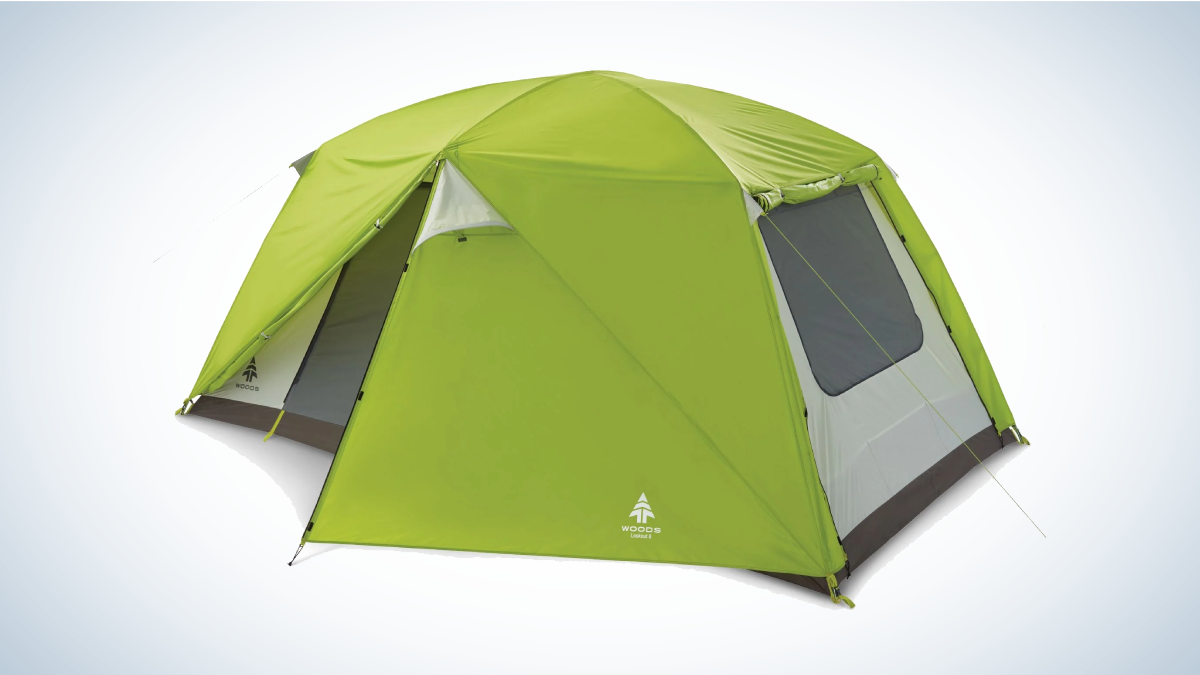
Specs
Materials: Poly ripstop 210-tex 68-denier, aluminum poles
Floor Dimensions: 12 x 7 feet
Packed Size: 24.75 x 9.25 x 9.25 inches
Peak Height: 74 in
Weight: 17 lbs
Pros
Interior gear storage on both ends of the tent
Excellent ventilation
Optimal weather protection
Good value for the price
Easy to set up and take down
Cons
Doesn’t come with a footprint
Not only is the Woods Lookout an excellent 6-person tent, it is also a relatively budget-friendly tent for durability and size. While I’ve never had six people in this tent, it has been the perfect car camping and paddle camping option when camping with a group of four or two dogs or for my partner and our three dogs. The floor and side panel fabric strength are the same throughout, making the entire tent highly durable. Unfortunately, it doesn’t come stock with a footprint, and I do recommend using one with this tent, especially in wet conditions.
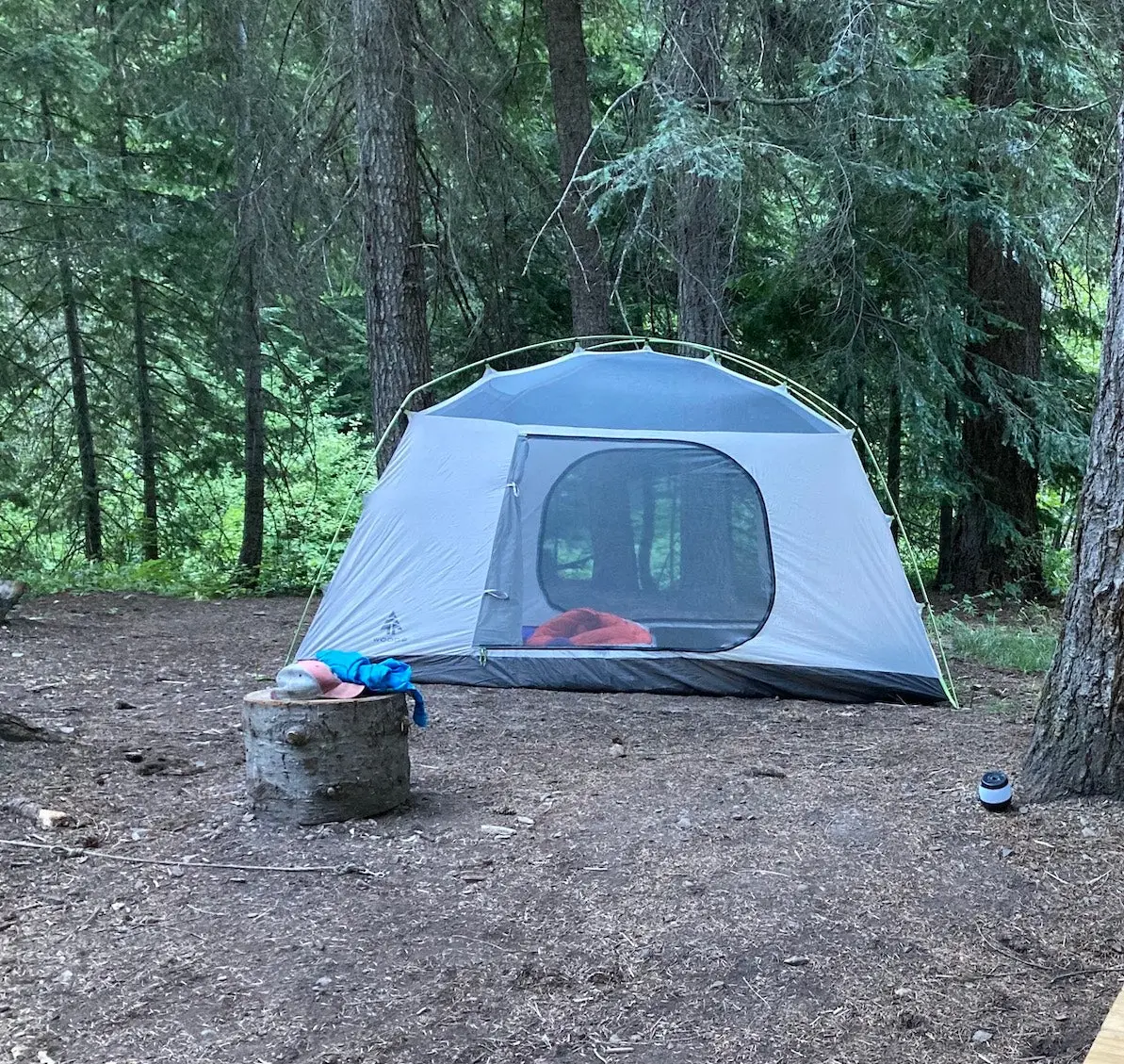
The Woods Lookout tent is very roomy inside—even my dogs love it. Meg Carney
The tent’s height makes it hard for one person to set up by themselves, but with two people, this tent goes up in just a few minutes. The peak height of the tent is 6 feet 2 inches, which makes it easy to pack and unpack. It’s also tall enough to move around while inside the tent without ducking. Sleeping six campers in this tent, along with all of their gear, would be pretty snug, but for a family camping tent, couples, or a group of four friends, you’ll have plenty of space with room to spare.
Best Canvas: White Duck Outdoors Prota Cabin Tent
Specs
Materials: 10.10 oz. Army Duck Cotton Canvas, aluminum poles
Floor Dimensions: 9 x 7 feet
Peak Height: 75 in
Weight: 66 lbs
Pros
Three size options available
Durable canvas materials
Tent and floor materials are connected
Holds up well in harsh weather conditions
Roomy interior
Cons
Ground tarp sold separately
Time consuming to set up compared to other cabin tents
Built to last, the White Duck Outdoors Prota Cabin Tent is versatile enough for glamping, spike camp, or family camping. It’s constructed with the durable DynaDuck Pro fabric standard in all White Duck canvas tents. It’s both water-repellent and PFC-free. The double-stitched seams, military-grade zippers, and shock-absorbing grounding system are a testament to the quality design features and durability of the tent construction.
While I can’t say that this tent is as quick and easy to set up as other cabin tents on our list, it’s pretty simple compared to other canvas tents. The part that takes the longest is pounding the heavy-duty steel stakes into the ground with the provided mallet. Fortunately, everything you need is included and you can set up the tent in under twenty minutes. The only piece missing that some campers may want is a ground tarp, which isn’t standard for canvas tents. But that isn’t necessary in all conditions, as this canvas tent conveniently has a floor built into the design.
Best Budget: Coleman Instant Cabin Tent
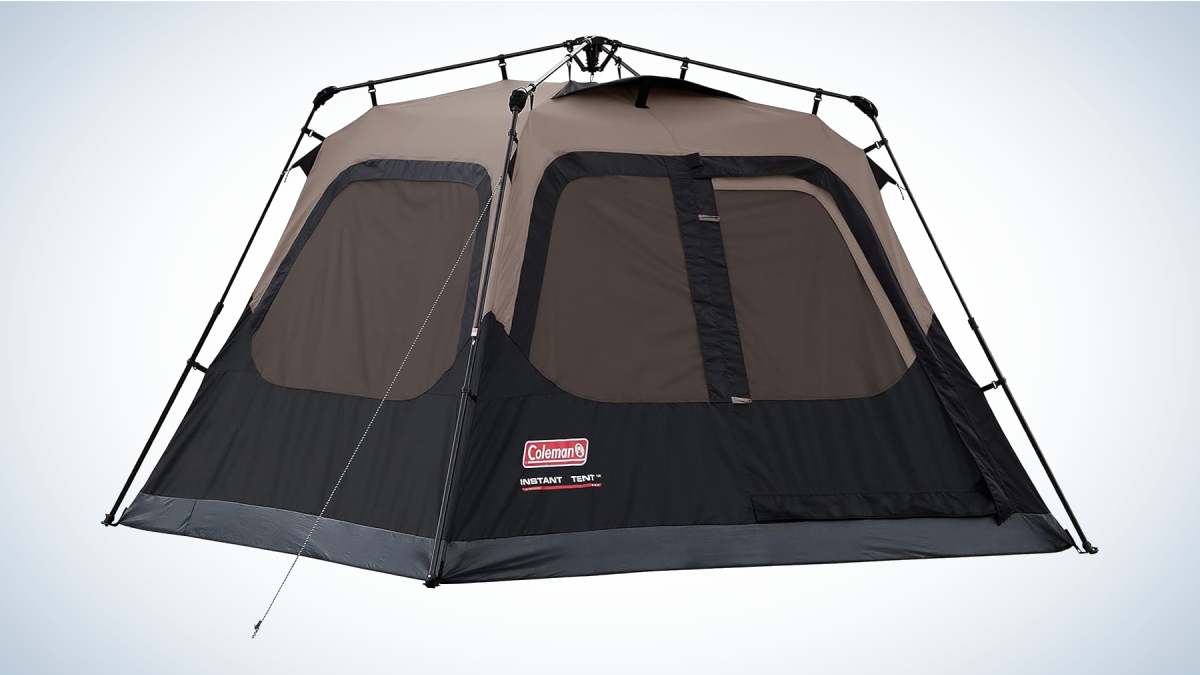
Specs (4-person)
Materials: Double-thick Polyguard 2X fabric
Dimensions: 8 x 7 feet
Peak Height: 59 in
Weight: 19 lbs
Pros
More affordable than other cabin tents
Instant setup
Fits a queen size air mattress
Adequate ventilation
Decent weather resistance for a budget tent
Cons
Shorter peak height than other cabin tents
Not the most durable
Coleman is a long-standing brand for affordable camping gear, and the Coleman Instant Cabin Tent is one of its highest rated tents. While it’s available in several capacities, we prefer the 4-person tent. While it isn’t quite as tall as other cabin tents on our list, it still offers way more headroom than a standard camping tent. The instant setup is a draw for many family campers who seek to simplify any part of the camp setup they can.
In terms of durability, the first thing on many Coleman tents that fades is waterproofing, a coating that can be reapplied. Since water resistance is a key feature in the best cabin tents, keep in mind that cheaper tents need more maintenance and upkeep if you want them to last a long time. Luckily, the rest of the tent is relatively durable, and you can easily repair parts like the zippers or mesh.
How We Tested Cabin Tents
My introduction to camping started almost 30 years ago in a cabin tent. Since then, I’ve had the opportunity to use a variety of brands and sizes in nearly all weather conditions. While I currently gravitate towards backpacking, I still spend a fair number of nights each year sleeping in a cabin tent with my partner and our three dogs. To choose the best cabin tents for this list, I used my experience with cabin design and industry knowledge of top tent manufacturers.
Once I narrowed down the brands I planned to include, I had conversations with brand representatives to gather information about their most popular models. From there, I had the opportunity to test a few tents to see how well they performed in the wild.
These are the primary factors I considered:
Ease of use
Price
Durability
Required maintenance
Space and size
What to Consider When Choosing a Cabin Tent
Intended Use
To narrow down your options, you should first always consider the intended use of your outdoor gear. More than likely, if you’re shopping for a cabin tent, you intend to use it for car camping. However, other factors like the time of year, number of people, and additional camp gear also play a role in which tent works best.
Capacity
Because packed size isn’t usually a concern with car camping, we recommend getting a tent with a capacity of two people larger than you need. For instance, if you’re camping with four people, opt for a six-person tent. This gives you more room to move around and/or store gear, and everyone can sleep comfortably.
Materials and Durability
The materials, construction, and tent design all influence the tent’s durability. The tent body, floor, and rainfly are typically made from synthetic fabrics that are a blend of fibers like polyester or nylon. You can easily identify how durable the material is by looking at the fabric denier number, which measures the thickness of the individual thread fibers. The higher the denier number, the thicker and stronger the fabric fibers and weave should be.
Note: Some parts of a tent are more durable than others. For instance, the tent floor and corners may be stronger and more reinforced than the tent windows made from mesh materials or even the tent door.
Consider tent components like the poles, stakes, and guylines, too. Tent poles are generally made from fiberglass, carbon fiber, or aluminum alloy. Steel tent poles might be an option for canvas tents but are uncommon in instant or freestanding tents because of the weight. Fiberglass poles are heavier and less durable than aluminum or carbon fiber but are much cheaper. If you’re buying an instant tent with the poles attached to the fabric, ensure the poles will last just as long as the fabric to save you time and money on a difficult repair later.
Weather Protection
Most cabin tents are three-season tents, which means they’re not designed for use in winter weather conditions. (However, you can use a canvas cabin tent year-round with the proper preparations.) No matter the time of year, the weather resistance—which includes moisture like rain or snow and high winds—will keep you comfortable and safe while camping.
Since cabin tents have higher walls and a boxier design than other tent shapes, having quality stakes and guylines is essential when camping in windy conditions. With adequate stakes, it can be easier to keep the tent in place, and it is possible for high winds to damage the fabric when appropriately secured.
Waterproof tent fabrics have some coating, such as silicone, DWR, or a PFC-free solution. If a tent is labeled as water resistant, all that means is that the fabric fibers are woven so tightly that it is difficult for moisture to penetrate the materials, but it is still possible for the materials to become saturated with enough exposure to moisture.
Weight and Packed Size
Weight and packed size aren’t quite as crucial with cabin tents as a backpacking tent, but it may still be a consideration for some individuals. If you have limited storage space at home or in the vehicle, having a cabin tent that packs down small and isn’t too heavy to carry may be essential.
An instant cabin tent or a canvas tent will be bulkier and potentially heavier when packed. Standard freestanding tents with poles separated from the tent fabric making them more compact and easier to pack. Regardless of the tent design, look for tents with a storage container that’s easy to pack, unpack, and carry.
FAQs
Q: Are cabin tents waterproof?
The best cabin tents should have waterproofing of some kind to ensure they withstand rain and snow while camping. Look at the materials listed and see if there is a waterproof coating. If it states “water-resistant” instead of waterproof, it likely doesn’t have a waterproof coating, which means the fabric may become saturated in heavy rains.
Q: What is an instant tent?
Most instant tents have a cabin shape and are ready to be set up as soon as they’re unfolded. They often have built-in poles attached to the fabric. Instant tents may also be called pop-up tents—in general, instant tents refer to any tent that sets up or “pops up” instantaneously upon unfolding.
Q: What are the disadvantages of cabin tents?
The primary disadvantage of a cabin tent is its size and weight. They’re mostly intended for car camping. Cabin tents are generally unsuitable for backpacking or any camping that requires a sizable hike to the campsite. For that, you’ll want one of the best ultralight tents.
Q: What are the advantages of cabin tents?
The primary advantage of cabin tents is that they provide standing room and additional storage space that most other tent shapes do not offer. The tall walls and ceiling make moving around the tent easy. They often feature wall-off sections to create multiple rooms, so you can share one with multiple people.
Final Thoughts
The best cabin tents should have ample standing room, adequate ventilation, and plenty of interior storage space. They should be able to stand up to winds and rain and, most importantly, be easy to set up. I chose the Nemo Aurora Highrise as the best cabin tent overall due to its high durability, comfort, and functionality. Nemo is a staple brand in the industry and is well-known for their innovative designs and sustainability efforts. They’re a tent brand we trust no matter the type of camping or time of year.
Why Trust Us
For more than 125 years, Field & Stream has been providing readers with honest and authentic coverage of outdoor gear. Our writers and editors eat, sleep, and breathe the outdoors, and that passion comes through in our product reviews. You can count on F&S to keep you up to date on the best new gear. And when we write about a product—whether it’s a bass lure or a backpack—we cover the good and the bad, so you know exactly what to expect before you decide to make a purchase.


